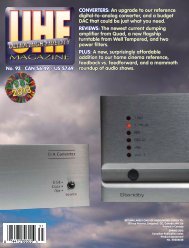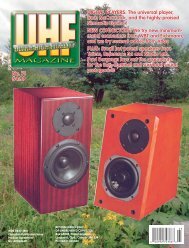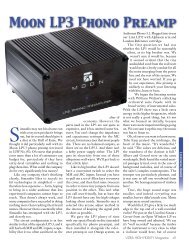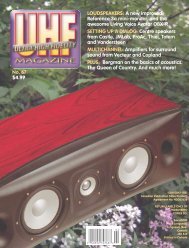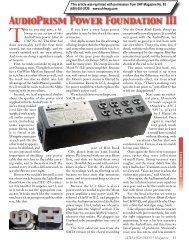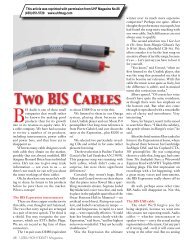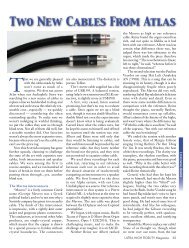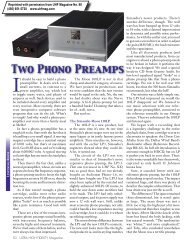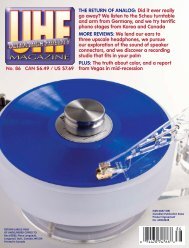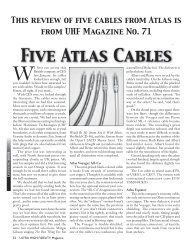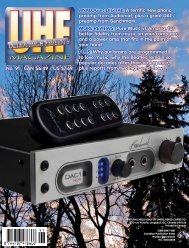A Terrific Tube Preamplifier From Korea, And A - Ultra High Fidelity ...
A Terrific Tube Preamplifier From Korea, And A - Ultra High Fidelity ...
A Terrific Tube Preamplifier From Korea, And A - Ultra High Fidelity ...
Create successful ePaper yourself
Turn your PDF publications into a flip-book with our unique Google optimized e-Paper software.
Gentlemen, I, Rachmaninoff,<br />
have just heard myself play! He<br />
might have been a snob, to<br />
judge from that quote.<br />
“I, Rachmaninoff!” Perhaps we don’t<br />
understand the Russian syntax behind<br />
the second language. Ya, Rachmaninoff...<br />
Software<br />
Rachmaninoff<br />
the Neo-Romantic<br />
Although he spent the second part of his<br />
life in the West, an American resident<br />
and in his last days a citizen, he surrounded<br />
himself with Russian.<br />
Was he a snob? Almost universally<br />
by Toby Earp<br />
recognized as one of the greatest pianists<br />
of his age, he became accustomed,<br />
throughout his career, to critical attacks<br />
on his compositions. They never left him<br />
unfazed, the way they seemed to slide off<br />
Igor Stravinsky. When one piece was<br />
well received, in 1943 not long before<br />
his death, he commented that this was<br />
remarkable. “It must be my last flicker.”<br />
Russian humor, perhaps. Many works<br />
were revised several times during his<br />
lifetime. It is almost as though he was<br />
not sure they were actually any good.<br />
Yet Sergei Rachmaninoff was a<br />
perfectionist in recording, refusing<br />
the release of many because he was not<br />
satisfied with his performance. Yes, he<br />
left recordings, and some of them are<br />
excellent. This is where I want to begin<br />
with Rachmaninoff.<br />
The recordings represent perhaps<br />
the most modern part of his legacy,<br />
along with some compositions like the<br />
Fourth Piano Concerto. For with the<br />
great classical composers the question<br />
remains: how would he (or in rare cases,<br />
she) have played that work? We cannot<br />
hear a performance by Bach, Mozart,<br />
Beethoven or Chopin today, and the<br />
earlier the composer, the further we get<br />
from the practice of the time. Perhaps we<br />
can never know if a modern version represents<br />
a great understanding, or merely<br />
a great egotism. Rachmaninoff, however,<br />
has left us recordings of his own works<br />
(and others’ as well), with which he was<br />
satisfied. Today, a first hearing of one of<br />
his original performances can have an<br />
uncanny quality, as though the past had<br />
moved in next door.<br />
His first discs — 10”, 78 rpm — were<br />
for the Edison company in 1919. He did<br />
not stay with Edison long, however. It<br />
was common practice at the time to<br />
release alternative takes of a piece, and<br />
Edison did exactly that, much against<br />
Rachmaninoff’s wishes. Thomas Edison<br />
himself, deaf by then, had recorded little<br />
classical repertoire as yet, and perhaps<br />
he did not understand the artist. At any<br />
rate Rachmaninoff left for Victor, which<br />
was happy both to give him the terms he<br />
wanted and to respect them.<br />
ULTRA HIGH FIDELITY Magazine 63



